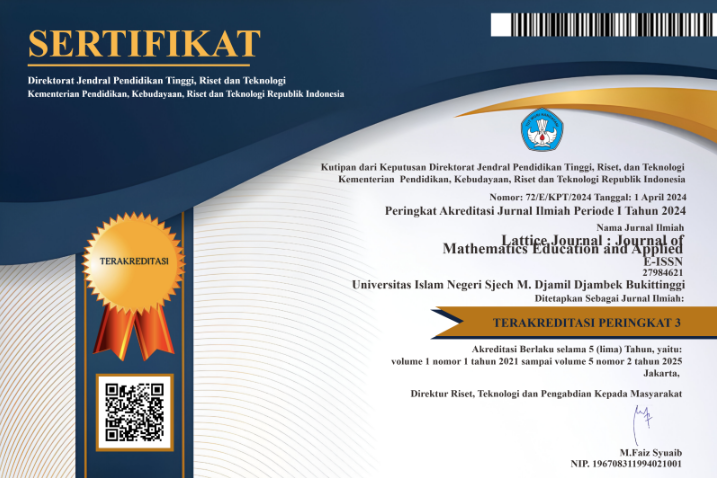Pengaruh Kemandirian Belajar terhadap Kemampuan Pemecahan Masalah Matematika Siswa Kelas VIII SMP Negeri 7 Lubuk Basung
DOI:
https://doi.org/10.30983/lattice.v1i1.4971Keywords:
Kemandirian Belajar, Kemampuan Pemecahan Masalah MatematikaAbstract
This research is motivated by students experiencing difficulties in solving problems in the form of descriptions and students' problem solving abilities in learning mathematics are still low at SMP Negeri 7 Lubuk Basung in the 2020/2021 academic year, this is indicated by the lack of independence of students in learning mathematics. The purpose of this study was to determine whether there was a significant effect of learning independence on the mathematical problem solving abilities of eighth grade students of SMP Negeri 7 Lubuk Basung in the 2020/2021 academic year. The statistical analysis technique used in this research is regression analysis. The results of this study obtained a correlation coefficient value of rxy = 0.543 and a determinant coefficient value of KD = 29.4849% From hypothesis testing, for the significant effect of learning independence on mathematical problem solving abilities of class VIII students of SMP Negeri 7 Lubuk Basung obtained Zcount = 3.801 and Ztable = 1.96 at 0.05 confidence. The regression equation between learning independence and mathematical problem solving ability of eighth grade students of SMP Negeri 7 Lubuk Basung Y = -30.009 + 1.126X. If Zcount > Ztable, then the research hypothesis is accepted. This means that there is a significant effect of learning independence on students' mathematical problem solving abilities.
Penelitian ini dilatarbelakangi oleh siswa mengalami kesulitan dalam menyelesaikan soal berbentuk uraian dan kemampuan pemecahan masalah siswa dalam pembelajaran matematika tergolong masih rendah di SMP Negeri 7 Lubuk Basung Tahun Pelajaran 2020/2021, hal ini diindikasikan oleh kurang mandirinya siswa dalam pembelajaran matematika. Tujuan dilaksanakan penelitian ini untuk mengetahui apakah terdapat pengaruh signifikan kemandirian belajar terhadap kemampuan pemecahan masalah matematika siswa kelas VIII SMP Negeri 7 Lubuk Basung Tahun Pelajaran 2020/2021. Teknik analisis statistik penelitian yang digunakan adalah analisis regresi. Hasil penelitian ini diperoleh nilai koefisien korelasi sebesar rxy = 0.543 dan nilai koefisien determinan sebesar KD = 29.4849% Dari pengujian hipotesis, untuk pengaruh signifikan kemandirian belajar terhadap kemampuan pemecahan masalah matematika siswa kelas VIII SMP Negeri 7 Lubuk Basung diperoleh Zhitung = 3.801Â dan Ztabel = 1.96 Â pada kepercayaan 0.05. Persamaan regresi antara kemandirian belajar terhadap kemampuan pemecahan masalah matematika siswa kelas VIII SMP Negeri 7 Lubuk Basung Y = -30.009 + 1.126X. Jika Zhitung > Ztabel , maka hipotesis penelitian diterima. Artinya terdapat pengaruh yang signifikan kemandirian belajar terhadap kemampuan pemecahan masalah matematika siswa.
References
Hasbullah, Dasar-Dasar Ilmu Pendidikan, Revisi. Jakarta, 2008.
Hamka, Tafsir Al-Azhar (Juz’ 13, 14,15, 16). Jakarta: Gema Insani, 2015.
Rusman, Model-Model Pembelajaran Mengembangkan Profesionalisme Guru, 2nd ed. Jakarta: Rajawali Pers, 2014.
Wiwik Suciati, Kiat Sukses Melalui Kecerdasan Emosional dan Kemandirian Belajar. Bandung: CV. Rasi Terbit, 2016.
U. S. Heris Hendriana, Euis Eti Rohaeti, Hard Skills dan Soft Skills Matematik Siswa. Bandung: PT. Refika Aditama, 2018.
Erman Suherman, Strategi Pembelajaran matematika Kontemporer. Bandung: Universitas Pendidikan Indonesia, 2003.
Yusuf Hartono, Matematika Strategi Pemecahan Masalah. Yogyakarta: Graha Ilmu, 2014.
Yusup Ansori, “Pengaruh Kemandirian Belajar terhadap Kemampuan Pemecahan Masalah Matematis Siswa SMP,†Math. Educ. IKIP Veteran Semarang, vol. 3, 2019.
Suharsimi Arikunto, Manajemen Penelitian. Jakarta: Rineka Cipta, 2013.
Syofyan Siregar, Statistik Parametrik Untuk Penelitian Kuantitatif: Dilengkapi dengan Perhitungan Manualdan Aplikasi SPSS Versi 17, 1st ed. Jakarta: Bumi Aksara, 2014.
Riduwan, Belajar Mudah Penelitian Untuk Guru-Karyawan dan Peneliti Pemula. Bandung: Alfabeta, 2013.
W. Y. Akmil Fuadi, “Kemampuan Pemecahan Masalah Matematika Siswa melalui Penggunaan Model Learning Cycle (LC) pada Materi Pecahan di Kelas VII,†Pendidik. Mat., vol. 2, 2014.
M. A. Sambas Ali Muhidin, Analisis Korelasi, Regresi, dan Jalur dalam Penelitian. Bandung: Pustaka Setia, 2007.
K. R. P. I Komang John Angga Putera, I Putu Ade Andre Payadnya, “Pengaruh Kemandirian Belajar Terhadap Kemampuan Pemecahan Masalah Matematika Siswa Kelas X SMA Negeri 6 Denpasar Tahun Ajaran 2018/2019,†Pros. Senama PGRI, vol. 1, 2019, doi: 10.5281.
Downloads
Published
How to Cite
Issue
Section
Citation Check
License
Authors who publish with Lattice Journal : Journal of Mathematics Education and Applied agree to the following terms: Authors retain copyright and grant the Lattice Journal : Journal of Mathematics Education and Applied right of first publication with the work simultaneously licensed under a Creative Commons Attribution License (CC BY-SA 4.0) that allows others to share (copy and redistribute the material in any medium or format) and adapt (remix, transform, and build upon the material) the work for any purpose, even commercially with an acknowledgement of the work's authorship and initial publication in Lattice Journal : Journal of Mathematics Education and Applied. Authors are able to enter into separate, additional contractual arrangements for the non-exclusive distribution of the journal's published version of the work (e.g., post it to an institutional repository or publish it in a book), with an acknowledgement of its initial publication in Lattice Journal : Journal of Mathematics Education and Applied. Authors are permitted and encouraged to post their work online (e.g., in institutional repositories or on their website) prior to and during the submission process, as it can lead to productive exchanges, as well as earlier and greater citation of published work (See The Effect of Open Access).



